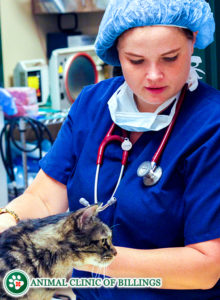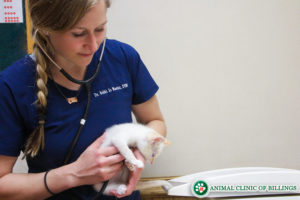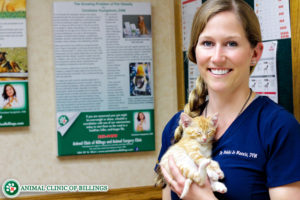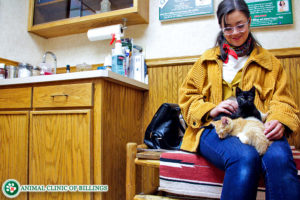Distemper
 What is distemper?
What is distemper?
Distemper is an old term that has been used for this feline disease based on a somewhat similar disease in dogs. However, it is more properly known as feline panleukopenia. The word “panleukopenia” means a decrease in the number of white blood cells; therefore, feline panleukopenia is a disease in cats that causes the white blood cell count to fall far below normal.
 Since white blood cells are important in defending against infections and disease, this makes them vulnerable to other infections. In addition to causing a low white blood cell count, this disease also causes severe damage to the lining of the stomach and intestines.
Since white blood cells are important in defending against infections and disease, this makes them vulnerable to other infections. In addition to causing a low white blood cell count, this disease also causes severe damage to the lining of the stomach and intestines.
What is the cause?
Panleukopenia is caused by a virus of the parvovirus family. It is related to the virus that causes parvo in dogs, which has similar clinical signs.
 How is the infection transmitted?
How is the infection transmitted?
The virus is shed in all body secretions, particularly feces, of infected cats. It can be ingested directly or transferred to a susceptible cat via contaminated water, food bowls or even shoes. The incubation period from infection until clinical signs develop is typically three to five days, but seldom longer than a week.
What are the clinical signs?
While symptoms may vary, cats typically experience a very deep depression or listlessness that may progress to collapse. Vomiting and diarrhea are frequent, and the diarrhea may be watery or contain blood. The hair coat quickly becomes dull and rough and the skin loses it elasticity due to dehydration. Often, cats with panleukopenia have other infections because their immune systems are compromised.
 Can my pet be treated?
Can my pet be treated?
As with most viral diseases, there is no specific treatment that kills panleukopenia. Secondary infections that typically occur with the disease are treated with antibiotics.
Dehydration and shock are life-threatening components of panleukopenia; intravenous fluid therapy and intense nursing care are critical to control these conditions. Drugs are also given to control vomiting and diarrhea. Some cats do not recover from this disease, but many will if aggressive supportive therapy is given.
How can I protect against panleukopenia?
Fortunately, vaccines are available and are routinely recommended by veterinarians as part of a preventative care program. The immunity conferred by a panleukopenia vaccine is generally strong and long-lasting, but it decreases with time. Therefore, annual boosters are highly recommended.
Are there any long-term consequences?
No. Once the virus runs its course, the lining of the stomach and intestines recovers quickly without scarring. In addition, the bone marrow produces new white blood cells to replace those that were lost. The cat recovers completely.
How do I disinfect my house?
Since the panleukopenia virus is difficult to kill, most disinfectants are not effective. We recommend cleaning with one cup of chlorine bleach per gallon of water, taking care not to bleach any furniture, carpet or other unfit item
SCHEDULE A CARE APPOINTMENT WITH THE ANIMAL CLINIC OF BILLINGS TODAY!
While caring for a pet can certainly be one of the most fun and rewarding experiences you can have, if you are under-informed about the needs of your new friend, you can leave them at a developmental or debilitating disadvantage.
 At the Animal Clinic of Billings and Animal Surgery Clinic, pet care is one of our greatest joys. Our veterinary staff would be delighted to spend some time with you and your companion ensuring that your relationship will be a healthy, happy and rewarding one for many years to come.
At the Animal Clinic of Billings and Animal Surgery Clinic, pet care is one of our greatest joys. Our veterinary staff would be delighted to spend some time with you and your companion ensuring that your relationship will be a healthy, happy and rewarding one for many years to come.
Please call to schedule a care appointment with us today!
406-252-9499 REQUEST AN APPOINTMENT




